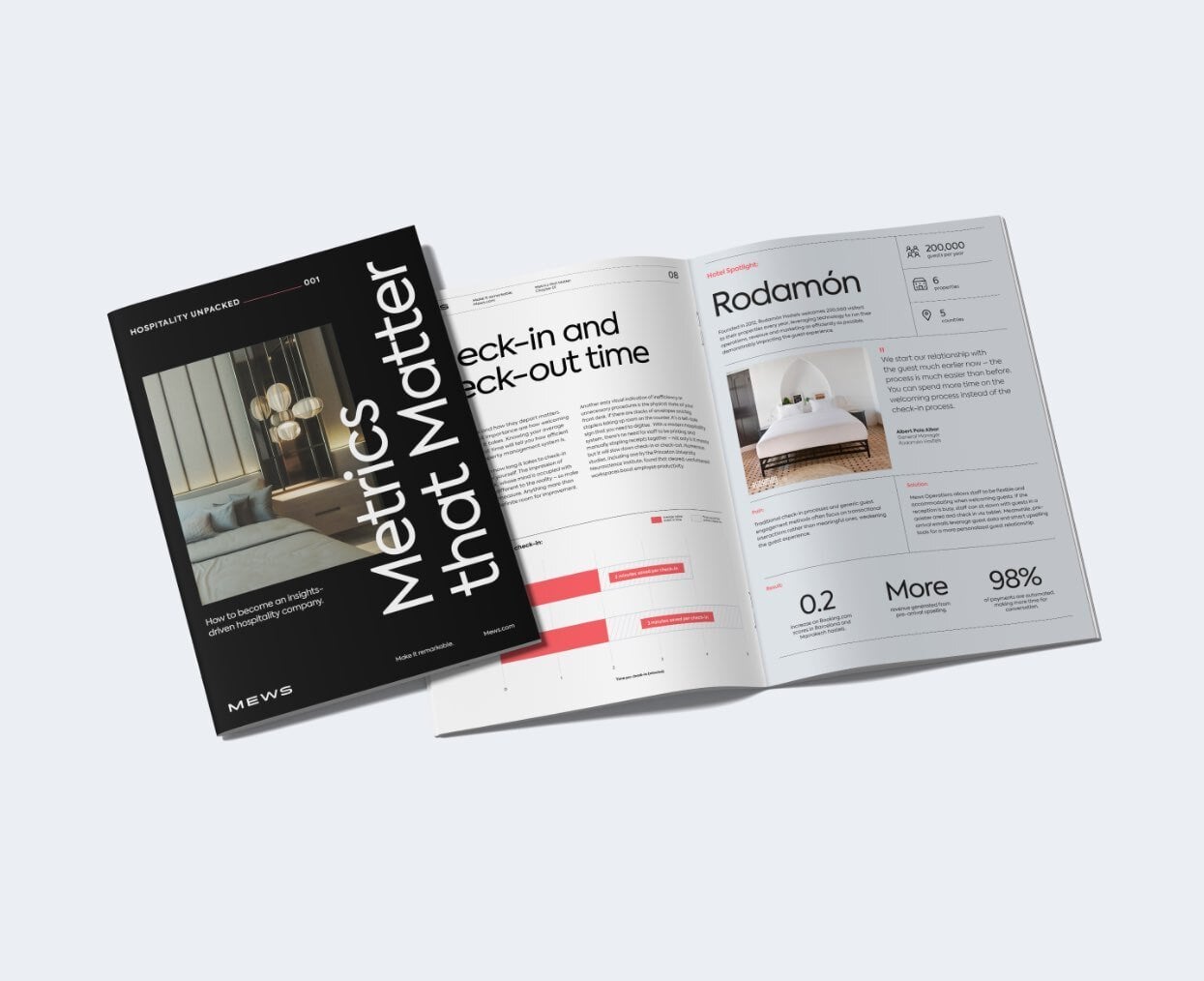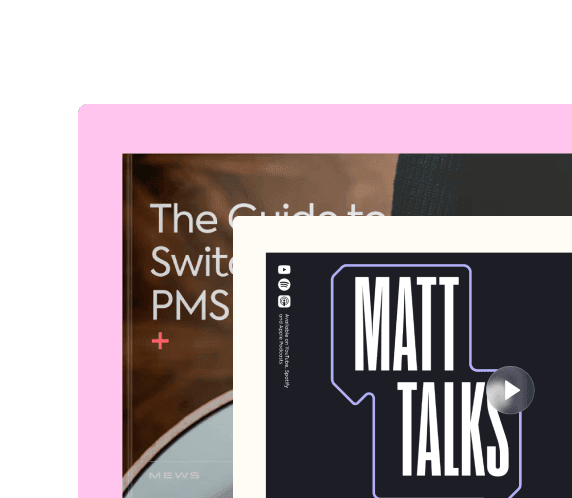Hotel segmentation is at the heart of any successful hotel operation. It helps to crack the code for your marketing strategy, tailoring your offers and revealing growth opportunities while optimizing revenue management strategy and profitability. By identifying where business is coming from and what motivates guests to complete a purchase, you can better define effective pricing strategies and target your offer to meet their needs.
We'll look at hotel market segmentation in more detail – its benefits, the most common segments, steps to implement guest segmentation, as well as how smart hotel tech can make this possible.
What is hotel market segmentation?
Hotel market segmentation is the process of grouping guests into various categories based on shared characteristics and behavior. It helps to define revenue management strategies and better understand guest preferences, needs and demands. From there, you can tailor marketing strategies, services and offerings to meet the requirements of each segmented group.
Learn more about hotel guest profiles and how to create them.

Why is market segmentation important?
Market segmentation is essential to a successful marketing strategy. By identifying your target audience, you can design products and services that fit their needs and preferences. This allows you to craft more effective campaigns and offerings, tailoring your messaging to better connect with your audience and drive impactful results.
What are the benefits of hotel market segmentation?
Using segmentation, hotels can optimize their operations, carry out targeted marketing efforts, enhance the customer experience through personalization and maximize revenue by creating targeted offers and experiences. You can also identify areas for growth and unexploited business opportunities within your market.
Segmentation also allows hotels to stand out from the competition by focusing on specific audience segments, improving positioning for traveler profiles and gaining a competitive edge. Additionally, this information aids in more accurate forecasting and adjusting rates and budgets based on various target profiles.
Gain a competitive edge
Market segmentation offers a significant competitive advantage. By listening to your guests and tailoring experiences to their preferences, you create a unique selling proposition that attracts and retains loyal customers. This personalization leads to positive reviews, further enhancing your hotel's reputation and distinguishing it from competitors.
Improved marketing campaigns
Targeted marketing efforts are key to achieving positive campaign results. By focusing your messaging on specific audience segments, you create more resonant and effective campaigns. This approach not only increases conversion rates but also optimizes your advertising spend, resulting in a better return on investment for your marketing initiatives.
Optimized operations
Segmentation can significantly enhance your hotel's operations. Different segments have distinct booking and travel patterns. For example, retirees may prefer off-season travel, so adjusting staffing levels to accommodate these fluctuations ensures optimal service throughout the year.
Moreover, effective inventory management becomes possible when you understand each segment’s unique needs. For instance, reserving larger rooms for families during school holidays ensures that you meet their needs and maximize occupancy. Additionally, segmentation helps you allocate your marketing budget more efficiently, aligning it with demand trends.
Enhanced guest satisfaction
The better you can segment your audiences, the more you can deliver guests what they want. Designing experiences and services that match their needs and desires leads to enhanced guest satisfaction.

What are the most common hotel market segments?
Hotel market segments may vary based on your property type, but there are five main categories.
Wholesale
The wholesale segment refers to those leisure guests or FITs (free independent travelers) who book through a wholesaler with special negotiated rates. The wholesalers get better rates by booking bulk room blocks, which they resell to third-party sites like tour companies, production crews, and both online and offline travel agencies.
Transient
Transient travelers are FITs or business travelers who typically book last minute directly through the hotel, travel agent, or an OTA. They may be walk-in guests, same-day bookings or guests who book a few days in advance. Find out the advantages of transient business.

Corporate negotiated
Corporate negotiated rates refer to corporate travelers with agreed-upon rates settled in advance by hotels and travel management companies. Hotels usually give these special rates in exchange for the business committing to a minimum number of nights per year.
Group
The group segment refers to guests traveling in a group that has blocked several rooms in advance at a special rate. Groups usually reserve at least six to ten rooms per night – they may be corporate, family, special events, MICE, and other types of groups. Find out how to attract group bookings to your hotel.
Other
The “other” segment is used for the rest of the guests. They are lumped together and could be military, government and complimentary rooms, employee or other industry segments.
How to target the correct market segment?
In order to target the correct market segment, you can start by analyzing what your hotel’s desired characteristics are and designing your ideal customer profile. This way you can prioritize based on how large the segment is and its ability to grow and contribute to your hotel’s profitability. Then by looking for patterns in your data, you can group the customers based on their preferences, pain points, demographics, geography, psychographics (such as lifestyle, interests and guest personality) and behavior.
From here you can develop your audience profiles and design offers and marketing campaigns to adapt to each of these segments.
6 steps to implement guest segmentation at your hotel
Now that you know what market segmentation is, let's explore how to implement this strategy in your property.
Collect the data
No strategy can be complete without collecting data first, usually from PMS analytics. The purpose is to understand who your guests are, their motivations, travel patterns, length and purpose of stay, requested services and upsells, preferred channels, etc.
Identify existing groups and those groups your hotel wants to reach
Once you understand who your guests are, you can identify patterns and adjust the offer accordingly. You can also determine which groups you're not reaching and how to do it. Divide them into trackable segments such as business, leisure, corporate, wholesale, or OTAS. Based on the volume in each group, you can decide whether to break them down further into subgroups.
Channel segmentation
Find out the booking method your different target segments are using. Are they reserving through an OTA and direct channels? Are they walk-ins or working with travel agents? By understanding where your guests are coming from, you can work on optimizing channels to attract different audiences.
Adapt marketing strategies to the target audience
Once you've identified target audiences and where they're booking, you can adapt marketing strategies to help attract your ideal guests. This way, you can reach guests with relevant messaging, promotions and offers, increasing the possibility of engaging your target audience.

Implement pricing strategies
Through a strategic approach to segmentation, hotels can maximize revenue potential and pricing strategies to appeal to specific segments. Hotels can then adjust their pricing strategies to focus efforts and resources on attracting and retaining the most valuable customers with the highest ADR.
Analyze and refine
Once you've put these strategies into practice, you can analyze the results and decide which segments are worth focusing on – usually, those that generate the most revenue. You can implement different offers and customize them for each target audience, changing deals and prices to be more attractive to each target profile. It's all about trial and error.
What types of tools can help with segmentation?
The most important tool for hoteliers to rely on for segmentation is your Property Managment System. Your PMS should help create guest profiles and track preferences, guest actions and behaviors so you can use this information to group similar guest profiles together. You can also gather insights into purchasing patterns so that you can better target your offers. Since all the information is stored in one place, this should be at the foundation of your toolkit.
You can also rely on other tools like customer relationship management software (CRM) such as Salesforce and HubSpot, Data Analytics Tools like Google Analytics, Machine Learning and AI Tools, Business Intelligence Tools and Loyalty Program Platforms. But, without a doubt a PMS is the most important tool for hoteliers, allowing you to segment based on booking patterns and stay history, among other characteristics.
How can Mews help your hotel with segmentation?
You can rely on hospitality technology like Mews Property Management Software to provide the reporting and analysis needed to make data-driven decisions. It will help you understand each segment's performance based on historic data and target figures. You can also create guest profiles to understand where to focus your business and easily track KPIs to spur growth.
Conclusion
We've looked at hotel market segmentation, its benefits, the most common segments, and how to implement it in your hotel. The goal is to empower hotels to go on a deep dive into their ideal customer profile. That way, you can better target offers, optimize operations and improve your bottom line by attracting and retaining guests.
Download our guide "The metrics that matter"

Written by

Eva Lacalle
Eva a plus d’une décennie d’expérience internationale dans le marketing, le marketing numérique, la communication et l’événementiel. Lorsqu’elle ne travaille pas, elle aime surfer, danser ou explorer le monde.










